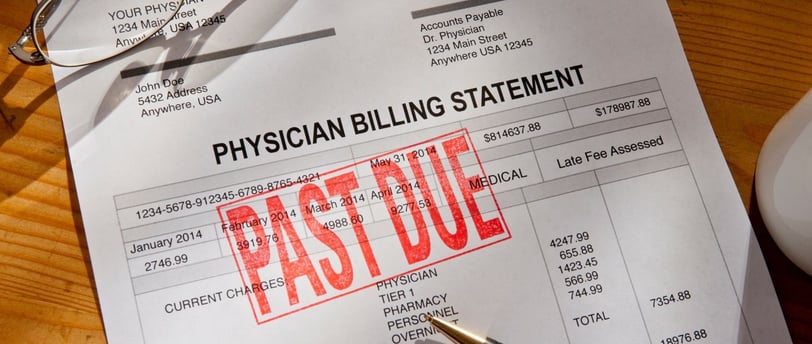Try our Patient Advocate Chatbot FREE - Try AskAuntKate
Demystifying Health Insurance Billing and Denials: A Comprehensive Guide
Medical bills often arrive weeks after you see a doctor—and can be confusing or unexpectedly high. This post shows you how to read your bills, understand denials, appeal when necessary, and find help if costs get out of hand.
INSURANCE AND BILLING
Aunt Kate
6/1/20254 min read


Understanding Your Medical Bills
Medical bills can often appear complex, but breaking them down into understandable components is key to managing your healthcare expenses. Initially, it is crucial to familiarize yourself with common billing terms. For instance, terms such as “copayment,” “deductible,” and “coinsurance” are frequently used but can create confusion. A copayment is a fixed amount you pay for a covered service, while a deductible is the total amount you must pay before your insurance starts to cover services. Coinsurance, on the other hand, is the percentage of costs for covered services that you owe after reaching your deductible.
When reviewing a medical bill, services are typically itemized, detailing every procedure, test, or visit you received. Each line item will usually display the provider’s charge, which is the amount billed by the healthcare professional. However, this amount might differ significantly from what your insurance company actually pays. The contracted rates between your provider and insurance play a crucial role in determining your out-of-pocket costs, as insurers generally negotiate lower fees. It is essential to cross-reference the billed amount with your insurance plan to ascertain what portion is your responsibility.
To navigate your medical bills effectively, begin by checking for any discrepancies. Look for services you may not have received or duplicate charges. Keeping organized records of your medical history and insurance correspondence can be beneficial when addressing potential errors. If you encounter inaccuracies, contact your provider’s billing department for clarification and resolution. Understanding your medical bills not only empowers you as a patient but also aids in minimizing unexpected medical expenses while ensuring you are paying only for the services provided.
Common Reasons for Insurance Denials
Health insurance denials can often be attributed to a range of factors that may complicate the claims process. Understanding these common reasons can empower patients and providers alike to navigate the complexities of health insurance billing more effectively.
One prevalent reason for claim denials is coverage issues. Insurance policies are typically bound by specific terms regarding what medical services or treatments are covered. If a healthcare provider renders services that fall outside the scope of the patient's plan, the claim is likely to be denied. Moreover, certain treatment procedures may require prior authorization before they are rendered; failure to obtain this authorization can lead to automatic denial of the claim.
Coding errors also frequently contribute to denied claims. Health care providers use specific codes to describe diagnoses and procedures when filing claims. An incorrect or incomplete code can result in a denial as it may not align with the required billing guidelines set by the insurance carrier. Thus, accuracy in coding is crucial to ensure claims are processed smoothly and correctly.
Eligibility problems can also hinder successful claims. Insurance companies typically require policyholders to maintain current status regarding their coverage. If a patient’s policy is expired or if they have not met their deductible, the claim may be rejected. It is advisable for patients to regularly verify their eligibility and benefits with their insurance provider.
Lastly, missed deadlines for filing claims or responding to requests from the insurance company can result in denials. Each insurance provider has specific timeframes within which claims must be submitted or appealed. Being aware of these deadlines and adhering to them is essential for ensuring a favorable outcome in the claim process.
How to Appeal Denied Claims
Appealing denied health insurance claims can be a daunting task, but understanding the process is crucial in ensuring that you are not left with unexpected healthcare expenses. The first step in appealing a denied claim is to thoroughly review the explanation of benefits (EOB) provided by your insurance company. This document will outline the specific reasons for the denial and is essential for guiding your appeal strategy.
Next, gather all relevant documentation that supports your case. This may include medical records, billing statements, and any communication with your healthcare provider. Ensure that all documents are accurate and up to date, as they will serve as vital evidence during the appeals process. If necessary, reach out to your healthcare provider for clarification or additional documentation that may strengthen your appeal.
Once you have assembled the necessary information, the next step is to write a formal appeal letter. Start your letter by including your personal information, the details about the denied claim, and a clear statement indicating that you are formally appealing the denial. In the body of the letter, address the specific reasons for the denial mentioned in the EOB and provide a logical argument supported by your documentation. Be concise and stick to the facts; a well-organized letter can significantly enhance the chances of a successful appeal.
After sending your appeal, it is important to keep track of all correspondence with your insurance company. Document dates, times, and the names of individuals you speak with, as this information may be helpful if you need to escalate your appeal. Be aware that insurances are required by law to respond to your appeal within a certain timeframe, so follow up if you do not receive a timely response. Understanding your rights and being proactive can empower you to effectively navigate the complexities of denied health insurance claims.
Finding Help and Resources for Managing Medical Costs
Navigating the complexities of medical bills can often be overwhelming for patients. Fortunately, various resources are available to assist individuals grappling with medical expenses. One primary avenue for seeking assistance is financial assistance programs offered by hospitals and healthcare providers. Many institutions have established these programs to support patients with limited financial means. Eligibility conditions can vary, so contacting the billing department of your hospital or provider directly is advisable to inquire about available options.
In addition to financial programs, non-profit organizations can provide critical support. Organizations such as the HealthWell Foundation, the Patient Advocate Foundation, and various disease-specific charities often have programs designed to help individuals cover out-of-pocket expenses. These non-profits work tirelessly to connect patients with grants and funds specifically earmarked for medical bills, thereby alleviating some financial burdens.
Also, state resources and local community organizations may offer assistance with medical costs. Many states provide programs for low-income families or individuals who qualify for Medicaid or other financial aid. Researching state-specific healthcare assistance programs can yield additional resources tailored to residents’ needs. Websites that list state initiatives can serve as valuable tools in locating relevant organizations in your area.
Moreover, when managing medical bills, proactive communication with healthcare providers can facilitate better outcomes. Patients are encouraged to negotiate charges, especially when faced with high out-of-pocket costs. Developing a clear understanding of the billed services and preparing a list of questions can empower individuals during discussions with billing representatives. Lastly, implementing effective cost management strategies, such as budgeting and prioritizing medical expenses, can greatly enhance an individual's ability to handle medical costs efficiently.


